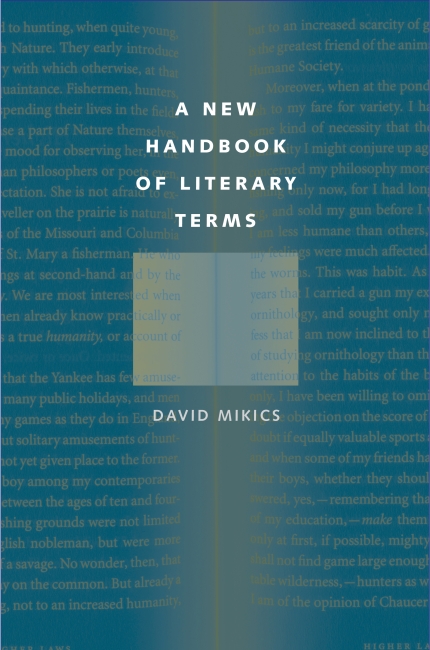From the preface to A New Handbook of Literary Terms by David Mikics (Yale University Press, 2007)
An ideal bibliography should include older, respected works that continue to shape our sense of what criticism can to. Auerbach’s Mimesis, first published in Switzerland in 1946, is still the indispensable book on realism. Mimesis is referred to repeatedly here, as is Northrop Frye’s definitive Anatomy of Criticism (1957), the best treatment of genre. Frye, like Auerbach, opened up a whole new world for criticism with his book, which continues to be central to literary study fifty years after it was written. A student who wants a sure grounding in literary history, and at the same time an exhilarating experience of criticism at the height of his powers, would do well to read Mimesis and Anatomy of Criticism—along with other synoptic and original works like James Nohrnberg’s The Analogy of the Faerie Queene, Harold Bloom’s The Visionary Company, Ian Watt’s The Rise of the Novel, Geoffrey Hartman’s Beyond Formalism, Martin Price’s To the Palace of Wisdom, Martha Nussbaum’s The Fragility of Goodness, Hugh Kenner’s The Pound Era, Irving Howe’s Politics and the Novel, Ronald Paulson’s Satire and the Novel, Frank Kermode’s Romantic Image, and William Empson’s Some Versions of the Pastoral. Curtius’ European Literature the Latin Middle Ages remains the essential guide to the topoi that engage medieval and Renaissance literature. These fourteen books, some of them published as long ago as the 1930s (Empson), provide the background and assumptions for much later work. Some more recent volumes, like Margaret Doody’s The True Story of the Novel, share the ambitions and innovative character of those I have just listed. The Handbook takes care not to slight younger critics—there are quite a few references from the new, twenty-first century—but I have emphasized those books that have already stood the test of time.
